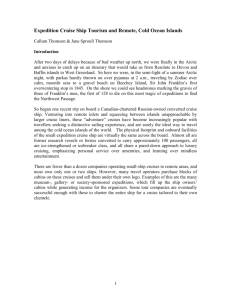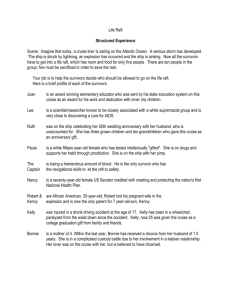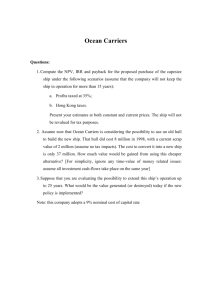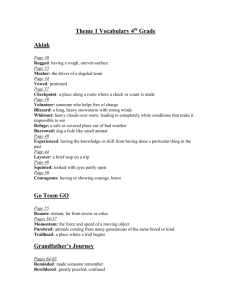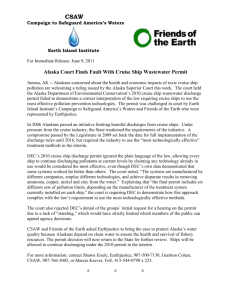Ship's Medical Negligence
advertisement
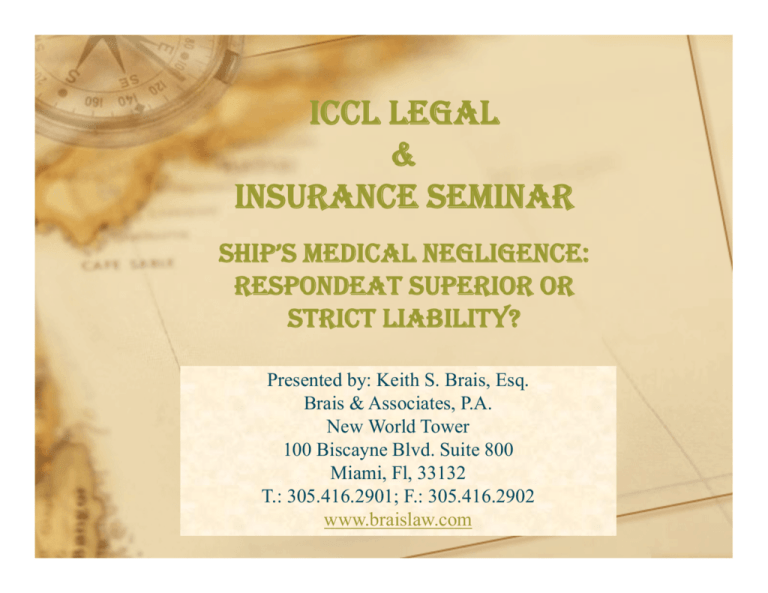
ICCL LEGAL & INSURANCE S C SEMINAR S SHIP S MEDICAL NEGLIGENCE: SHIP’S RESPONDEAT SUPERIOR OR STRICT LIABILITY? Presented by: Keith S. Brais, Esq. Brais & Associates, P.A. New World Tower 100 Biscayne Blvd. Suite 800 Miami, Fl, 33132 T.: 305.416.2901; F.: 305.416.2902 www.braislaw.com ANCIENT ROOTS As early as 1887, maritime courts refused to impose liability on a ship owner for f a ship hi doctor’s d ’ negligence li or substandard b d d care. Laubheim L bh v. De D Koninglyke Neder landsche Stoomboot Maatschappy, 13 N.E. 781 (N.Y. 1887)(A passenger sued a shipping line and alleged that the ship doctor negligently performed a surgery on her knee. knee The court held that the ship owner owner'ss duty to its passenger was to select a competent duly qualified doctor; the ship owner was only liable for its negligence in breaching this duty. It was not responsible for the negligence of the ship’s doctor.) Courts recognized that a master/owner cannot interfere in the treatment of the doctor when he/she attends a passenger – “the work which the physician or surgeon does is under the control of the passengers themselves.” O themselves. O’Brian Brian v. v Cunard S.S. S S Co., Co 28 N.E. N E 266 (Mass. (Mass 1981) (A passenger sued the shipping line and alleged that the ship doctor was negligent in administering a vaccine. The court held that “[t]he law does not put the business of healing sick passengers into the charge of common carriers.”) “BASIC RULE” “A doctor’s negligence in treating i a passenger will ill not be imputed to the carrier.” The Napolitan Th N lit Prince, Pi 134 F. F 159, 159 160 (E.D.N.Y. (E D N Y 1904) The Korea Maru, 254 F. 397, 399 (9th Cir. 1918) The Great Northern, Northern 251 F. F 826, 826 830 830-32 32 (9th Cir. Cir 1918) Churchill v. United Fruit Co., 294 F. 400, 402 (D. Mass. 1923) p g Generale Transatlantique, q 11 F. Supp. pp Branch v. Compagnie 832 (S.D.N.Y. 1935) NIETES V. AM. PRESIDENT LINES LTD. LINES, LTD 188 F. Supp. 219 (N.D. Ca. 1959) California’s C lif i ’ Departure D t from f the th “Basic Rule” In 1959, the Northern District of California found that “when a carrier undertakes the treatment of illness through medical services … aboard the ship, it assumes the duty to treat carefully.” The Nietes court departed p from the basic rule based upon p the land-based “growing g g tendency y to hold the doctor a servant in special circumstances”, for example, where he is a resident physician on a hospital staff. The Nietes court considered the following factors in order to determine whether to impose liability on a carrier for a ship doctor’s negligence: 1. 2. 3. If the carrier pays the doctor’s salary; If the carrier can give the doctor orders; and If the carrier can subject the doctor to discipline. California s Court of Appeal for the First District California’s refused to “depart from established law” and did not adopt the holding in Nietes. DeRoche v. Commodore Cruise Line, Ltd., 1994 AMC pp 1994). ) 2347 ((Calif. Ct. App. The above factors established that the carrier had some control over the doctor aboard the ship. BARBETTA R V.. S/S BERMUDA STAR 848 F.2d 1364 (5th Cir. 1988) In 1988, the Fifth Circuit solidified the “basic rule” and refused to follow the Nietes’ reasoning. The Barbetta court addressed the following question: “Does general maritime law impose liability, under the doctrine of respondeat superior, upon a carrier or ship owner for the negligence of a ship’s doctor who treats the ship’s passengers?” The Barbetta court discussed two “justifications” for the basic rule: 1. The relationship between the passenger and the physician is not a traditional activity over which a cruise ship has control; the carrier lacks control over the doctor-patient relationship. 2. A ship is not a floating hospital. It is not in the business of providing medical services to the passengers. The Barbetta court noted that “the the Nietes court wrongly assumed that without respondeat superior liability a carrier could escape legal responsibility simply by providing any doctor for its passengers.” DUTY TO CHOOSE COMPETENT & QUALIFIED DOCTOR The Barbetta court reiterated the uniform admiralty rule that a carrier has a duty to choose a doctor who is competent and duly qualified. Barbetta held that “[t]o the extent that a carrier negligently hires an incompetent doctor”, the carrier can be found liable for its own negligence in selecting the doctor. aa. Warren v. v Ajax Navigation Corp. Corp of Monrovia, Monrovia et al. al , 1995 AMC 2609 (S.D. (S D Fla. Fla 1995)(holding that the general maritime law imposes upon a ship owner who elects to provide a physician for the convenience of his passengers the duty to use reasonable care in selecting a competent doctor) b. Mascolo v. Costa Crociere, S.p.A., 726 F.Supp. 1285, 1286 n.1 (S.D. Fla. 1989)(noting that when a carrier undertakes to employ a doctor aboard ship for its passengers’ convenience, the carrier has a duty to employ a doctor who is competent and duly qualified) c. Cummiskey v. Chandris, S.A., 895 F.2d 107, 108 (2d Cir. 1990)(affirming the district court’s holding that the duty of a ship’s owner or operator to passengers is limited to the exercise of reasonable care in selecting a competent and duly qualified physician) d. Hilliard v. Kloster Cruise, Ltd., 1991 AMC 314 (E.D. Va. 1990)(holding that a carrier does owe a duty to exercise reasonable care in selecting a competent and qualified doctor) e. Gillmor v. Caribbean Cruise Line, Ltd., 789 F.Supp. 488 (D.P.R. 1992)(holding that when a carrier undertakes to employ a doctor aboard ship for its passengers’ convenience, the carrier has a duty to employ a doctor who is competent and duly qualified). REASONABLE CARE IN HIRING A DOCTOR Reasonable care = conducting a reasonable inquiry into the doctor’s background and credentials. Metzger v. Italian Line, 1976 AMC 453 (S.D.N.Y.), aff’d mem., 535 F.2d 1242 (2d Cir. 1975). The doctor’s “fitness” must be “diligently inquired into and proper evidence of his/her qualifications received. received ” Cummiskey v. v Chandris, Chandris S.A., S A 719 F. F Supp. 1183, 1989 AMC 2561 (S.D.N.Y. 1989), aff’d, 895 F.2d 107, 1990 AMC 1452 (2d Cir. 1990). Courts have not made conclusive findings as to what qualifications the position of “shipboard doctor” requires. Benedict on Admiralty, Vol. 10, § 9.03, at 5 (2005). GUIDANCE FROM ICCL WHEN HIRING MEDICAL PERSONNEL ICCL has proposed a series of qualifications (for its member cruise lines) when hiring medical personnel: Knowledge of – Life support techniques Advanced life support Intubation & cardiac care Current valid medical license (domestic or international) Training in intravenous line placement General medicine or general practice experience 2-3 years of clinical experience Ability to be conversant in English CARLISLE V. CARNIVAL CORP. CORP 864 So.2d 1, 2003 AMC 2433 (Fla. 3d DCA 2003) The cruise line line’ss duty to exercise reasonable care under the circumstances extends to the actions of a doctor placed onboard a ship by the cruise line! The Carlisle court rejected Barbetta’s finding that a passenger at sea has meaningful control over his or her relationship with the ship’s doctor. doctor Instead, Instead the court found that “a cruise passenger at sea and in medical distress does not have any meaningful choice but to seek treatment from the ship’s doctor.” The Th Carlisle C li l courtt found f d that th t a seriously i l injured i j d or ill passenger is i sufficiently ffi i tl foreseeable and likely to disrupt maritime pursuits, thus, these incidents are “substantially related to traditional maritime activity.” Based upon this y , the court rejected j Barbetta’s argument g that a cruise line is not in the analysis, business of providing its passengers with medical care. The Carlisle court further pointed out that cruise lines are already held vicariously liable for the negligence of the “same same ship ship’ss doctor in the treatment of hundreds of people - - the crew.” . CARLISLE ANALYZED HOLDING: The ship doctor is an agent of the cruise line for purposes of fulfilling the cruise line’s duty to exercise reasonable care, regardless of his contractual status as an independent contractor. contractor Thus, Thus a ship doctor’s negligence can be imputed upon a cruise line. The Carlisle court found that the cruise line exercised a certain amount of control over the doctor’s medical services: 1. 2. 3 3. 4. 5. 6. 7 7. The cruise line selected the nurses The ship doctor was an officer of the ship Th cruise The i line li provided id d the h medical di l supplies li The ship doctor was subject to the ship’s articles The cruise line set the hours of operation of the infirmary The cruise line provided a policy and procedure manual for the operation of the infirmary The ship doctor was subject to dismissal by the cruise line for his failure to perform his duties (a) pursuant to the guidelines established by the cruise line and (b) to the satisfaction of the cruise line. NOTE: The Carlisle court inappropriately modified uniform general maritime law. At least one court has g a shipp owner for the negligent g g treatment stated that the qquestion of “whether a vicarious liabilityy claim against of its on-board doctor will stand under maritime law” is not settled at this time. Mack v. Royal Carribbean Cruise, Ltd., 838 N.E 2d 80 (III. App. Ct. 2005). The Supreme Court of Florida is currently reviewing the issue. PENDING REVIEW BY THE SUPREME COURT OF FLORIDA • The Supreme Court of Florida accepted jurisdiction of Carlisle and,, after receivingg briefs from Carnival,, Carlisle,, ICCL and FMLA, heard oral argument on September 27, 2005. • ICCL stressed the impact of Carlisle “will inevitably be forum shopping”. h i ” Its I brief b i f highlighted hi hli h d the h negative i i impact suchh a decision would have on the cruise line industry, i.e., the ruling subjects the cruise line industry to the application of inconsistent rules. l • The FMLA stressed that “it was legally inappropriate for the lower court to even enter into an analysis of the continued viability of the virtually unbroken line of cases dating back nearly 100 years, which have refused to impose vicarious liability upon a ship owner for the purported negligence of a ship ship’ss physician in a lawsuit brought by a passenger.” CURRENT ATTEMPTS TO AVOID CARLISLE MEDICAL FACILITY – CONSULTATION REQUEST GUEST Charges: Physicians are independent contractors contractors. All medical services are subject to charge based upon U S Government U.S. Go ernment Medicare Physician Fee Schedule rates. DISCLAIMER IN MEDICAL BILL Medical Services Bill Medical i Authorization A i i I understand that physicians are independent contractors … SOUTHERN DISTRICT OF FLORIDA The Southern District of Florida continues to vacillate on whether it should follow the basic rule emphasized in Barbetta or follow Nietes & Carlisle. 1990: Nanz v. Costa Cruises, Inc., 1991 AMC 48 (S.D. Fla 1990) (held that the basic rule that a cruise operator is not vicariously liable to passengers for the negligence of a properly qualified ship ship’s s doctor also applies to the ship ship’s s medical staff working under the doctor’s supervision; the court held that the doctor and the medical staff were the passengers’ servants) 1993: Fairley v. Royal Cruise Line Ltd., 1993 AMC 1633 (S.D. Fla. 1993) (the court d i d the denied th cruise i line’s li ’ motion ti to t dismiss di i stating t ti that th t the th cruise i line li could ld be b liable li bl for f the ship doctor’s negligence under the alternate theories of liability (not respondeat superior); for example, the cruise line could be vicariously liable under theories of apparent agency and joint venture. NOTE: The court, however, did not rule on the merits of the p passenger’s g claim since it was merely y reviewing g a motion to dismiss for failure to state a claim upon which relief could be granted. 1995: Warren v. Ajax Navigation Corp. of Monrovia, 1995 AMC 2609 (S.D. Fla. 1995) (the court granted the cruise company’s motion for summary judgment and found that it was unreasonable for the passenger to believe that the cruise company has “ authority authority” over the manner in which the ship doctor treated his patients; thus, the cruise company could not be held liable for the ship doctor’s negligence under a theory of apparent agency) NOTE: In reaching its decision, the court did not discuss its earlier decision in Fairley. The Court focused on the reasoning in Barbetta. CONTINUED CONFLICT IN THE S.D. S D FLA. FLA 2004: Huntley v. v Carnival Corp., Corp 307 F. F Supp. Supp 2d 1372, 1372 2004 AMC 728 (S.D. (S D Fla. Fla 2004)(the court denied the cruise line’s motion to dismiss the plaintiff’s vicarious liability claim against it for the alleged malpractice of a ship a doctor and followed Fairley by recognizing the possibility of a cruise line’s vicarious liability based on a theory of apparent agency; the court ignored its ruling in Warren and primarily relied upon the recent Florida Third District court of Appeal (Carlisle) care which rejected Barbetta and followed the minority rule set in Nietes) 2005: Doonan v. Carnival Corp., 404 F. Supp. 2d 1367 (S.D. Fla. 2005)(the court declined to follow the decisions in Huntley and Carlisle finding no justification to deviate from the majority rule stated in Barbetta; the court dismissed the claim against the cruise line for vicarious liabilityy for the ship p doctor’s alleged g negligence g g (premised on (p actual agency)) CONSEQUENCES OF CARLISLE & NIETES (AVOIDANCE TECHNIQUES) • There may be no consequences for operators with a forum selection clause outside of Florida (state court) or the Northern District of California, unless the court considers these decisions persuasive i authority h i andd a new generall trend. d • If, however, your forum selection clause selects Florida (state court) t) or the th Northern N th Di t i t off California District C lif i (and ( d until til Carlisle C li l is i decided by the Supreme Court of Florida) options may need to considered. AMEND CRUISE TICKET CONTRACT OPTION 1: REQUIRE SUIT TO BE BROUGHT IN FLORIDA FEDERAL COURT “Any and all disputes shall be litigated, if at all, before the United States District Court for the Southern District of Florida in Miami.” OPTION 2: REMAIN IN STATE COURT EXCEPT WITH REGARD TO MEDICAL MALFEASANCE “It is agreed by and between the Guest and [Carrier] that any and all personal injury and/or death suits arising from, or in connection to, negligent shipboard medical care shall be litigated if at all, litigated, all before the United States District Court for the Southern District of Florida in Miami…” CLAUSES WITHIN TICKET CONTRACT ARE GENERALLY ENFORCEABLE • Forum Selection Clause: Carnival’s ticket contract contained a forum selection clause that required all disputes to be litigated in a specific federal court. The state court granted Carnival’s motion to dismiss and the appellate court affirmed. affirmed Assiff v. v Carnival Corp., Corp 2006 Fla. Fla App. App LEXIS 8119 (Fla. (Fla 3d DCA 2006). NOTE: Not final until time expires to file rehearing motion and, if filed, disposed of. • Enabling Statute: The law permits a cruise line to contractually shorten the three-year period to commence a suit to recover damages in negligence for personal injury (or death). A one-year period to file suit is lawful under §183(a). Levick v. Steiner Transocean Ltd., 377 F. Supp. 2d 1251 (S.D. Fla. 2005). • Six Month Notice Clause: The District Court of P.R. granted Costa’s y Judgment g where a p passenger g failed to p provide written Motion for Summary notice within 6 months of a personal injury claim, as required by the ticket/contract of passage. The Appellate Court agreed and affirmed. Shankles v. Costa Armatori, S.P.A., et. al, 722 F.2d 861 (1st Cir. 1983). ANOTHER OPTION: CONCESSION AGREEMENT • Independent Contractor language within Concession Agreement • Cruise Line Named as an Additional Insured within Concessionaire’s Insurance Policy: − obtain certificate (proof) of insurance − underwriter to be acceptable by cruise line, i.e., AA rated • Unconditional Defend, Hold Harmless and Indemnification Clause • Concessionaire and Underwriter must agree to and/or waive personal jurisdiction and venue defenses to suit brought in cruise line’s chosen forum, i.e., state court Florida • Avoid geographical limitation to defense provided under concession agreement • Notice provision required to cruise line re impending lapse of coverage or reduction of coverage • No jurisdictional limitation within policy of insurance re obligation to defend or i d indemnify if • Choice of Law, i.e., Fla. Stat. § 627.428 or attorney’s fees clause “EXCULPATORY” CLAUSES IN CRUISE PASSENGER TICKETS Are exculpatory clauses against public policy and therefore unenforceable? According to the Eleventh Circuit, a cruise line’s ticket disclaimer stating it was not liable for the negligence li off its it “servants “ t or agents” t ” is i against i t public bli policy li and d cannott be b valid lid in i light li ht off 46 U.S.C. USC app. § 183(c). See, Kornberg v. Carnival Cruise Lines, Inc., 741 F.2d 1332, 1985 AMC 826 (11th Cir. 1984), cert. denied, 470 U.S. 1004 (1985). NOTE: Kornberg involved a class action suit for the failure of a sanitation system, not a ship’s doctor substandard medical care. The Third DCA has also held that exculpatory p y clauses attempting p g to disclaim liability y for the negligence g g of a ship p owner’s employees are unlawful. See, Carlisle v. Ulyssess Line Ltd., S.A., 475 So.2d 248 (Fla. 3d DCA 1985). Barbetta (1988), however, found a similar ticket provision valid. The court held that because “there was no liability to disclaim, the contractual provision [was] not a disclaimer; it is, instead, merely an accurate restatement of … general maritime law… law ” Fairley (1993) noted in a footnote that exculpatory clauses dealing with a carrier’s liability for providing medical care are contrary to 46 U.S.C. app. § 183(c). NON-DELEGABLE DUTY TO PROVIDE MAINTENANCE & CURE General Rule: A ship owner is liable for its negligent acts and the acts of its agents. This includes the negligent acts of shipboard AND tendered shore side medical providers. A ship owner has the obligation to tender a qualified doctor to crew. A ship owner/operator is vicariously liable for the negligence of its onboard doctor in the treatment of seamen. De Zon v. Am. Pres. Lines, 318 U.S. 660, 1943 AMC 483 ( (1943). ) A ship owner is liable for the negligence of a shore side provider p ov de se selected ected by tthee sship p ow owner e to pprovide ov de medical ed ca ca caree to the seaman. Gulf Central Steamship Corp. v. Sambula, 405 F.2d 291, 1968 AMC 2521 (5th Cir. 1968). ADDENDUM • In consideration of the decision by the Florida Supreme Court in Carnival Corp., v. Carlisle, 953 So. 2d 461; 2007 AMC 305 the author notes: • The Florida Supreme Court recognizing that “Federal maritime law [has] held that a shipowner is not vicariously liable for the medical negligence of [a] shipboard physician” to a ship’s passenger. • In following the Barbetta line of cases the Florida Supreme Court rejected the reasoning of the Nietes Court from the Northern District of California and, in so doing, quashed the opinion of the Third District Court of Appeals. • By following Barbetta the Florida Supreme Court adopted the following reasoning: − The relationship between the passenger and the physician is not a traditional activity over which a cruise ship has control; the carrier l k control lacks t l over the th doctor-patient d t ti t relationship. l ti hi − A ship is not a floating hospital. It is not in the business of providing medical services to the passengers. ICCL LEGAL & INSURANCE S C SEMINAR S SHIP S MEDICAL NEGLIGENCE: SHIP’S RESPONDEAT SUPERIOR OR STRICT LIABILITY? Presented by: Keith S. Brais, Esq. Brais & Associates, P.A. New World Tower 100 Biscayne Blvd. Suite 800 Miami, Fl, 33132 T.: 305.416.2901; F.: 305.416.2902 www.braislaw.com
